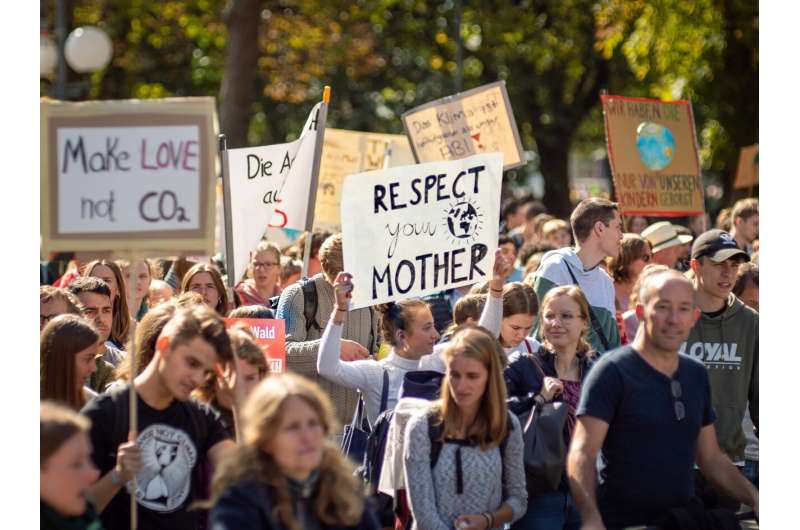Collective action helps young adults deal with climate change anxiety

A study from a coalition of researchers led by the Yale School of Public Health may have identified a potential buffer to climate woes: collective action.
"There is definitely more research to be done, and we can't make any claims about causality or the direction of the relationships," said YSPH Assistant Professor of Public Health (Social & Behavioral Sciences) Sarah Lowe, Ph.D., senior author of the study. "But [our findings] suggest that engaging in collective action can buffer the effects of climate change anxiety and prevent it from leading to feelings of sadness and hopelessness that would be consistent with major depression."
The findings are based on a survey of nearly 300 undergraduate and graduate students at universities in the United States. The team found that anxiety related to climate change was linked to symptoms of depression only among students who were not engaged in group activities to address climate change. For those who were engaged in collective activities—including community outreach, peer education, participation in advocacy groups and more—climate change anxiety was not significantly associated with depression symptoms.
Individual actions, like recycling and turning off lights, did not have the same benefits for students' mental health. The survey responses suggest that these activities were less effective because of a perception that they were insignificant in the face of climate change. For young people who are already more vulnerable to mental health distress, this sense of hopelessness can help bad feelings fester and grow, the researchers said.
Collective action, on the other hand, may have at least some capacity to help. Large-scale activities can foster a powerful sense of hope, community connection and social support, which can all help to combat symptoms of anxiety and depression, according to the research team. And the results from these actions can be much more tangible, from policy changes to legislative victories. The researchers wrote in the study that the survey responses add more evidence to the idea that agency can support the mental health of vulnerable populations.
But the results also show a dark side of climate change's impacts on young adults. Open-ended responses to the survey provided real examples of how the younger population is dealing with the impending sense of doom associated with growing up in an ever-changing climate. The students wrote in their answers that they expected a future of "widespread famine," disasters that can "wipe out populations" and a planet that is "unlivable" or "dying at a rapid rate." They fret about the morality of raising children in "a world that is currently on a climate clock," and one that is also currently, quickly and irreversibly facing damage.
"It seemed like they felt very overwhelmed by the scope of the problem," Lowe said. "But there was also a sense that the actions they were taking were just a drop in the bucket and were not going to push the needle in terms of climate policy."
Surprisingly, however, the researchers noted that while these worries were significant, the mean levels of climate change-related anxieties were relatively low. This may show that, at least for young adults in higher education, feeling worried about the future of the climate is not necessarily debilitating.
Still, Lowe said, collective action could be a promising way to address the real problem of climate anxiety.
"We're really thinking about the sense of social support and solidarity that students who engage in collective action have," she said. "They're with a group of like-minded people with whom they can discuss and process their feelings of climate change anxiety and not have that sense of sadness, hopelessness or isolation from other people. That can be really powerful."
The study appears in Current Psychology.
More information: Sarah E. O. Schwartz et al, Climate change anxiety and mental health: Environmental activism as buffer, Current Psychology (2022). DOI: 10.1007/s12144-022-02735-6




















